-
The Last Lunar New Year by Derek Künsken
Super high concept billions of years in the future is a tough sub-genre to pull off, as it can become very detached from any human relatability. Baxter and Egan can do it, and so can Künsken.
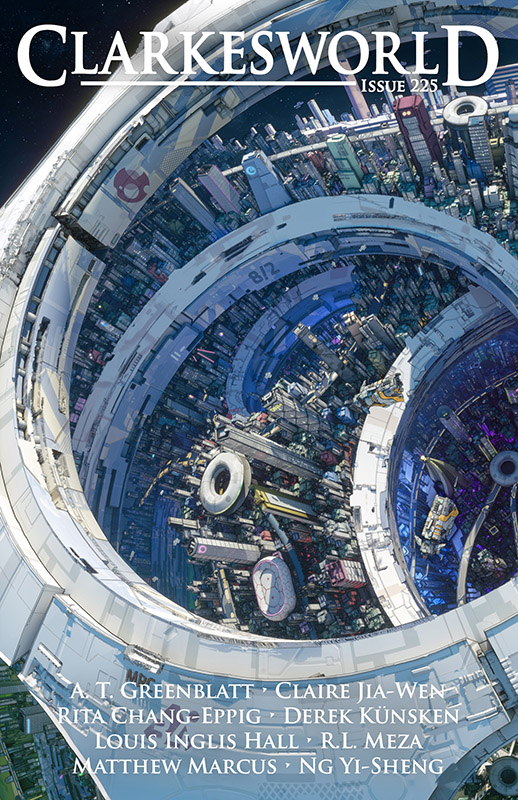
Humanity has evolved into multiple new species, some have engineered themselves so far that they aim to be able to survive the heat death of the universe. Others are bit more down to Earth so to speak.
Representatives from the various descenders from the human race are gathered in a court to discuss a wish from the aquatilis. They haven’t engineered themselves to survive the changing universe, but still want to live as long as possible, so they have a crazy plan to harness the energy from the exploding Moon to go back in time and live in the oceans of the Earth.
This leads to an interesting philosophical debate about evolution, consciousness, prime directive kind of ethics, and life, the universe and everything.
As the story is basically a court drama, it mostly consists of arguments back and forth, but the wild concepts and foundational world building makes this worth reading.
Read in Clarkesworld June 2025
Rating: 4 -
The Chronolithographer’s Assistant by Suzanne Palmer
This long adventure novella is the cover story on the latest issue of Asimov’s. Palmer is usually up for some well written entertaining stories. Without saying too much, this includes an interesting element of time travel.
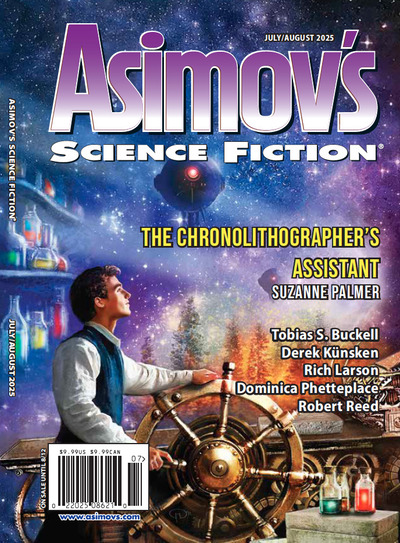
We follow 16 year old Thomas, who lives on an island and comes from a family of fishermen. Problem is that he is terribly afraid of the sea, after his father drowned in the ocean. Looking for an alternative way to get money and avoid the sea, he seeks a job with an odd lady in town. She works as sort some of artists, and he becomes her assistant helping her with errands, gather various ingredients in nature and in general assist her with her artwork.
Everything seems innocent enough, but there is something mysterious about this woman. Like it looks she sometimes drastically change her age from day to day, and she orders odd packages from far away places.
The story evolves into something larger and more adventurous than the initial rather mundane setting, and of course Thomas grows as a person and their relationship becomes something else.
Suzanne Palmer writes well, and despite the generous page count of this novella, there is never a dull moment. Even the mundane chores are compelling in their own right. We are kept in the dark for just long enough to be interested in what way this story might go, and it delivers in, well, going places.
Read in Asimov’s July/August 2025
Rating: 3+ -
In My Country by Thomas Ha
I asked on the Clarkesworld Discord for recommendations for must read stories this year, and this story was mentioned the most. I liked “Window Boy” as well and Thomas Ha clearly has an unique voice.
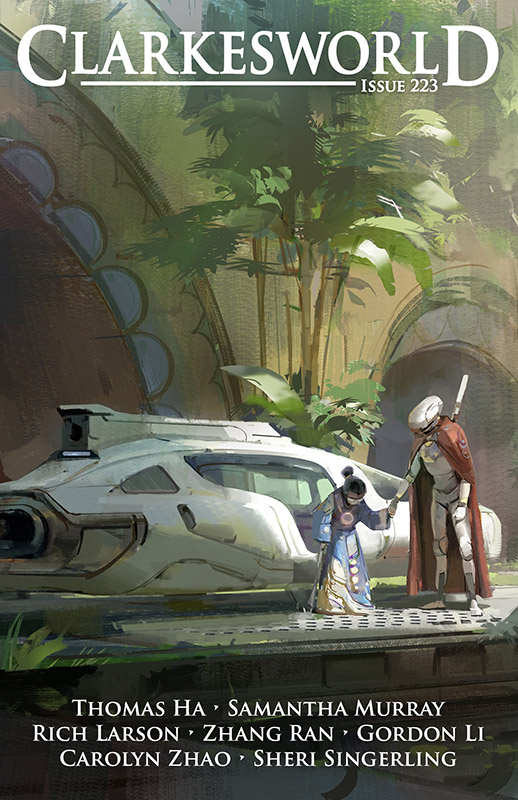
It hooked me right from the start, where you immediately get a sense of something being a bit off about this world, but we are deliberately kept in the dark on the details as the story is told from an inside perspective with their vocabulary. A reference to a blue house keeps being mentioned, and it is clear it has something to do with people working for the government, though what it is exactly isn’t immediately apparent.
In this society open satirical criticism of the people in power are allowed, but there isn’t free speech as such. Some stories gets censored and the narrative follows the parent of a writer, whose stories gets very popular, but they also draw the attention of the censors.
The culprit is that his stories are ambiguous, vague and open to interpretation. The authoritative regime knows that that sort of writing sparks critical thinking better than outright open criticism does. When people think for themselves and can put a piece of fiction into their own context, rather than something that is very clear in its message, is more dangerous for a regime that wants to keep the population under control.
This short story perfectly captures how and why good stories can do that, why something ambiguous and unclear can encompass more than open and shut cases. In the same vein, vague and seemingly random actions of censorships is frighteningly more effective than when the rules are clear. Definitely a story worth reading.
Read in Clarkesworld April 2025
Rating: 4 -
The Perfect Book by Ken Liu
This very short story reminded me of “Spark of Genius” by Michael F. Flynn as it is yes another story that basically predicts the present use of generative AI. Here we are presented with a shop that sells both coffee and algorithmically generated novels tailored perfectly to the readers personal preferences.
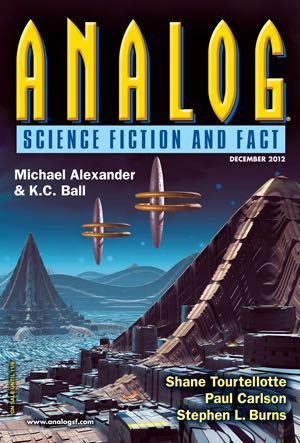
As the story is fairly there is little more to it than the premise here:
As he waited, he imagined the software routines searching through the vast database of quotations, snippets of books tagged by keywords and Book Genome metadata. The algorithms strung the snippets together into a coherent narrative, altered the selections, replacing names, dates, places, descriptions so that they all fit, tweaked and polished the whole thing so that it all appeared seamless and consistent.
p. 64
Unlike our world, in this story the authors are actually payed every time their contributions are used. However, the final morale of this story is one I 100% agree with, that art is meaningless if it isn’t fundamentally about communication between humans.
He wanted to tell a whole story, not to write snippets. He wanted it to be read from start to finish. He didn’t care if he would be paid.
p. 65
A poignant little story by one of the current living masters of the genre, that definitely deserves to be read in present times.
Read in Analog December 2012
Read the story at baen.com
Rating: 3+ -
Short Selling the Statistical Life by C. H. Irons
The concept of putting a price tag on a human life is an uncomfortable thought, but it is a thing that exists for statistical purposes. From my understanding mostly to help with cost/benefit analysis on for example construction work that will increase road safety. In this story the statistical life value is a bit more sinister, as it is a traded commodity on the stock market, and thus subject to manipulation and short selling.
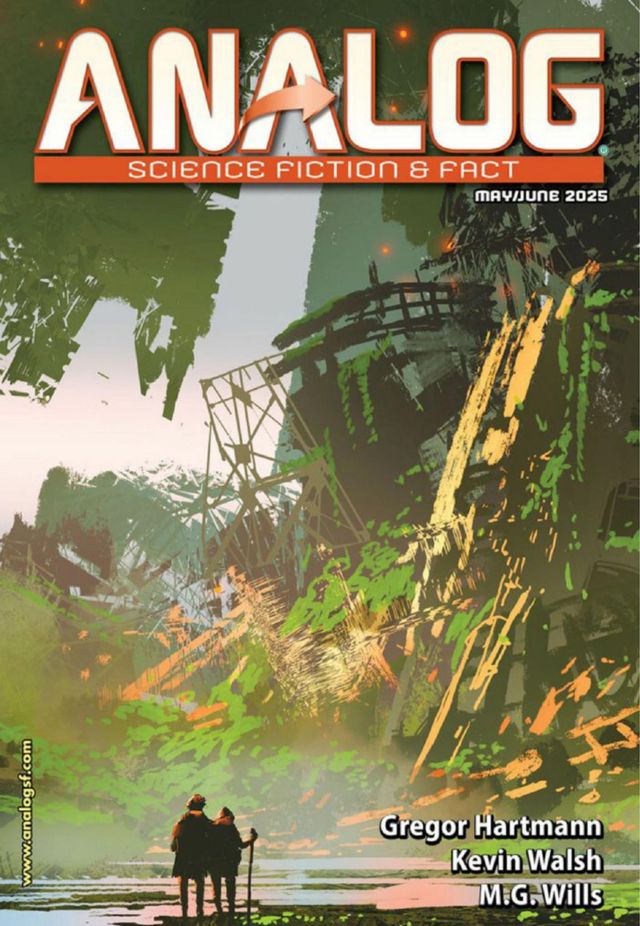
The story follows a healthcare worker who is contacted by mysterious people that claim to have a way to predictable predict future developments of the stock market evaluation of the statistical life index. They use that information to “short” the index and use the money to help underfunded hospitals. In their own words, they take advantage of the horrible market manipulation system to do some good instead. Our protagonist is sceptical at first to be in on this scheme, but goes through it with it.
This basic plot is mostly there to serve the world building for this dystopic future where the statistical life index is used to suppress workers. While I do like the idea behind this premise, I think it is less successful as a story. We don’t really get a proper understanding of what this statistical life concept does to regular people or society in general, only that the healthcare sector is underfunded, but you don’t need a science fiction story to write about that issue. I also miss some sort of more detailed explanation of why the index would go up or down. I can accept the vague reasons for why they have a solid way of predicting future market fluctuations, but there still need a real world event or reason to give perspective to why the index should suddenly crash hard. In that sense, the story come up short.
Read in Analog May/June 2025
Rating: 2 -
Quantum Ghosts by Nancy Kress
In this long novella published in two parts in the last two issues of Asimov’s, Nancy Kress tells a very action-packed futuristic exciting story with plenty of cool concepts and ideas. It is a future with sort of a next-level AI internet where people interface with it through a brain implant and some have even managed to upload themselves to a digital afterlife, in a cloud setup with no communication to the world of the living. Though all of that is threatened by a recent increase in solar activity.
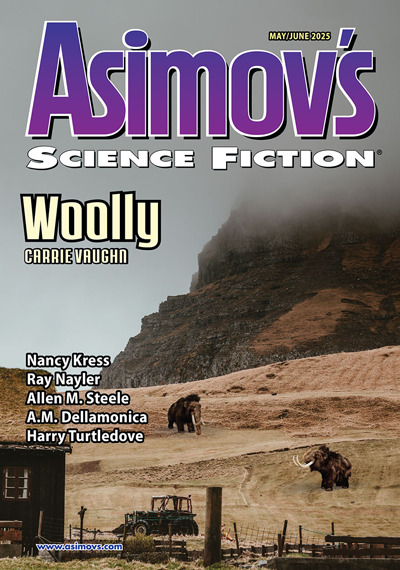
We follow young Kenda and her 5 year old sister as they are struggling to survive, and are forced to move into an especially bad part of the city in an apartment with frequent “ghost” appearances. As in electromagnetic disturbances from the nearby upload center for the rich dead people that messes with people chip implants. The story also follows Robert who is running for governor, and his daughter Hailey is seeking to get her chip removed as there is a growing sceptical movement on the effects and safety of the implants. The storylines converge in one big plot heavy action adventure.
There is clearly a lot going on in this story, but Kress writes well making the narrative easy and engaging to follow. It is very cinematic in the sense that it feels like scenes playing, with a long string of chapter cliffhangers, foreshadowing and dramatic plot points. While I must admit it makes for an entertaining read, it was also somewhat jarring. Like simply too much, and while Kress have always written stories filled with advanced tech and a dramatic narrative, this jumps the shark in some places and felt almost pulpy.
The story isn’t without some thematic depth though. The whole catastrophic situation it builds up to functions as a reasonable metaphor for how we are dealing with the current threat of climate change. As well as AI for that matter. While all of that is good, I just know that Kress is capable of unpacking such themes with more depth, as the interesting concepts presented here almost drowns in the action movie plot.
Read in Asimov’s March/April & May/June 2025
Rating: 3 -
Not Optimus Prime by Lorraine Alden
Stories about math are always interesting to me, and this short story has a cool premise with a researcher working on calculating very big prime numbers (in the 200 million digits range), where she find something unusual.
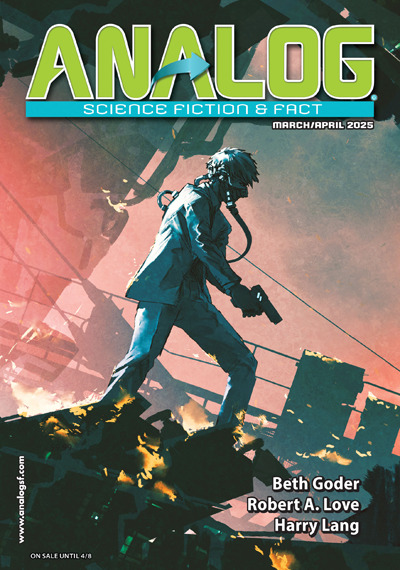
Vera is using an expensive quantum computer to calculate the biggest prime number found so far. While the calculation is running she chats with a tech working in the lab, and when the calculation successfully finds a new prime number; strange things starts happening with her computer.
This story reminded me of Dark Integers by Greg Egan and I am sure it has been an inspiration for the author, as Vera in the story is reading an Egan novel. I like how that is included.
Sadly however, the story more or less fell apart for me with its ending. Without revealing too much, the story takes a rather violent turn that I didn’t think were really warranted with the very sparse character development that was established, and it doesn’t really make the whole prime number mystery more interesting. It just adds more action that is completely unnecessary. The discovery was exciting enough on its own.
Read in Analog March/April 2025
Rating: 2 -
Earthgate by J. Brian Clarke
This novelette of space exploration reminded me quite a bit of the Heechee-stories by Frederik Pohl. Many planets are connected through a vast network of jumpgates built by a now long gone unknown species, but for some reason humans and another race called the Phuili are not connected. Gia sets out to find uncover the mystery accompanied by a Phuili.
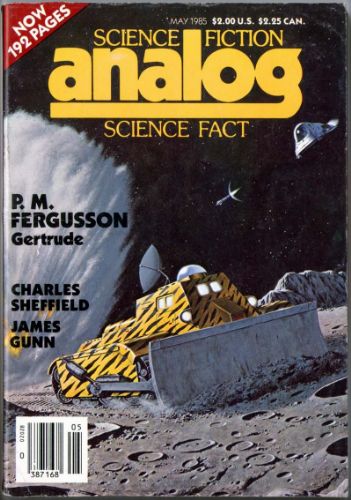
The general premise here isn’t a bad one as it has that aura of ancient alien technology that I never quite get tired of. However this story doesn’t do much more than provide the mystery of the jumpgates and while the conclusion is actually a nice one, it does show that the story is part of a series. There was a lot of filler that I didn’t think added much to this particular story, but would give a broader world-building or characterization.
Read in The 1986 Annual World’s Best SF, edited by Donald A. Wolheim
Originally published in Analog Science Fiction/Science Fact, May 1985
Rating: 2 -
Shadow of Shadows by Frank Ward
This story dives into the multiple worlds theory and quantum mechanics, but its flavor is more of a personal drama than theoretical physics speculation. We follow a physicists trying to test his theory while dealing with his less than enthusiastic students, but it is his tragic past that in an unexpected manner that end up moving him forward.
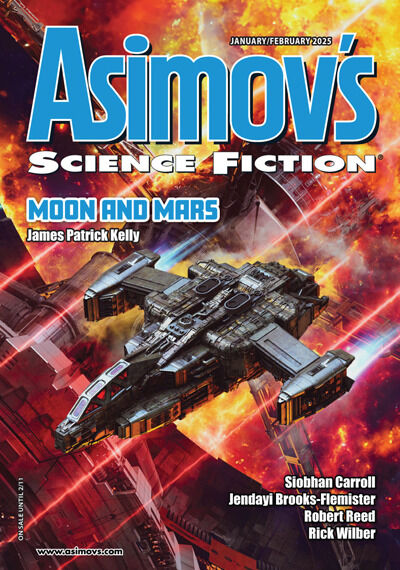
This well written story got me hooked very quickly. I was impressed with how quickly we get to understand, and feel, where the main character Sebastian is in his professional and personal life. His past gets naturally and gradually revealed, and the narrative is engaging even though it isn’t a story filled with conflict or drama.
The multiple worlds theory has been explored countless times in science fiction, and the scope of these types of stories can get quite wide, but Frank Ward keeps in close and personal which I really appreciated.
Read in Asimov’s January/February 2025
Rating: 4 -
Grace's Family by James Patrick Kelly
This is a story that is more about world building than plot. In the hands of someone like Kelly, that is a good thing. Set on an interstellar starship on a mission of exploration, we follow a young man and how he deals with the arrival of some new crew members.
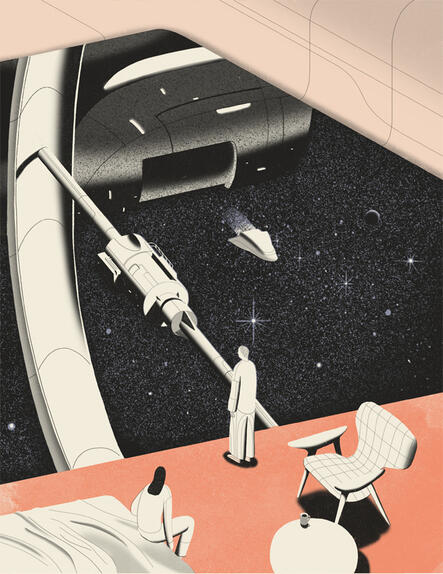
What I like about this story is how Kelly builds this little microcosmos and make it feel real. The information about the ship and its crew comes naturally, where their purpose of gathering information, not data - there is a specific point to the difference, is not fully explained, but it allows for some musings on humans place in the universe and the role of artificial intelligences.
And it is also a nice coming of age sort of story on top of that. Though given the title of the story, where Grace is the name of the ship, makes it actually more about her than the young protagonist.
Read in Forever Magazine, February 2025
Read online at Tor.com
Rating: 4